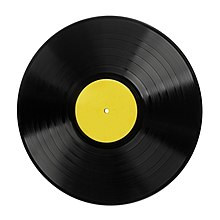Recording
Appearance

Sound recording and reproduction is an electrical, mechanical, electronic, or digital inscription and re-creation of sound waves, such as spoken voice, singing, instrumental music, or sound effects. The two main classes of sound recording technology are analog recording and digital recording.
| This theme article is a stub. You can help out with Wikiquote by expanding it! |
Quotes
[edit]- I can't believe that people really prefer to go to the concert hall under intellectually trying, socially trying, physically trying conditions, unable to repeat something they have missed, when they can sit at home under the most comfortable and stimulating circumstances and hear it as they want to hear it. I can't imagine what would happen to literature today if one were obliged to congregate in an unpleasant hall and read novels projected on a screen.
- Milton Babbitt; quoted in Classic Essays on Twentieth-Century Music, ISBN 0028645812
- We have all been affected as composers, as teachers, as musicians by recordings to an extent that cannot possibly be calculated as yet or predicted for the future. The music which is being most widely disseminated and most widely discussed, and therefore most widely imitated and influential, is that music which is available on records. The music that is only published is very little known. I don't think one can possibly exaggerate the extent to which the climate of music today is determined by the fact that the total Webern is available on records, that the total Schoenberg is becoming available.
- Milton Babbitt; quoted in Classic Essays on Twentieth-Century Music, ISBN 0028645812
- For me, the most important thing is the element of chance that is built into a live performance. The very great drawback of recorded sound is the fact that it is always the same. No matter how wonderful a recording is, I know that I couldn't live with it -- even of my own music -- with the same nuances forever.
- Aaron Copland; quoted in Classic Essays on Twentieth-Century Music, ISBN 0028645812.
- I hope my recordings of my own works won't inhibit other people's performances. The brutal fact is that one doesn't always get the exact tempo one wants, although one improves with experience.
- Aaron Copland; quoted in Classic Essays on Twentieth-Century Music, ISBN 0028645812
- If the listener does eventually come to the point where he makes the ultimate performance by splicing tapes from other musicians' recordings, he [sic] will eventually become just as bored with it as with other recordings, for it will still always be the same. Look, for instance, at electronic music. The boys are already becoming bored with what they do because they put it irrevocably on tape. The best indication of this is that more and more they are mixing the live performance element with their tapes.
- Aaron Copland; quoted in Classic Essays on Twentieth-Century Music, ISBN 0028645812.
- My experience of the original Edison phonograph goes back to the period when it was first introduced into this country. In fact, I have good reason to believe that I was among the very first persons in London to make a vocal record, though I never received a copy of it, and if I did it got lost long ago. It must have been in 1881 or 1882, and the place where the deed was done was on the first floor of a shop in Hatton Garden, where I had been invited to listen to the wonderful new invention. To begin with, I heard pieces both in song and speech produced by the friction of a needle against a revolving cylinder, or spool, fixed in what looked like a musical box. It sounded to my ear like someone singing about half a mile away, or talking at the other end of a big hall; but the effect was rather pleasant, save for a peculiar nasal quality wholly due to the mechanism, though there was little of the scratching which later was a prominent feature of the flat disc. Recording for that primitive machine was a comparatively simple matter. I had to keep my mouth about six inches away from the horn and remember not to make my voice too loud if I wanted anything approximating to a clear reproduction; that was all. When it was played over to me and I heard my own voice for the first time, one or two friends who were present said that it sounded rather like mine; others declared that they would never have recognised it. I daresay both opinions were correct.
- Herman Klein; quoted in The Gramophone magazine, December 1933
- People have a good reason for saying that because the Japanese have been smart. They have visited Jamaica and they bought maybe 90 per cent of our vinyl collection and that vault is now in Japan. I talking classic vinyl that your grand parents used to collect. The Japanese came here and they knocked door to door and bought out the vinyl records...so most of our catalogue is in Japan.
- Wee Pow, in The Sunday Gleamer, as qtd. in Anton Spice, "“90% of Jamaica’s vinyl collection is in Japan” – Iconic sound system owner speaks out", The Vinyl Factory, (June 12, 2017)
- We did not see the value in vinyl, and so we were quick to sell them to the Japanese, and now they have all the gold.
- Wee Pow, in The Sunday Gleamer, as qtd. in Anton Spice, "“90% of Jamaica’s vinyl collection is in Japan” – Iconic sound system owner speaks out", The Vinyl Factory, (June 12, 2017)

